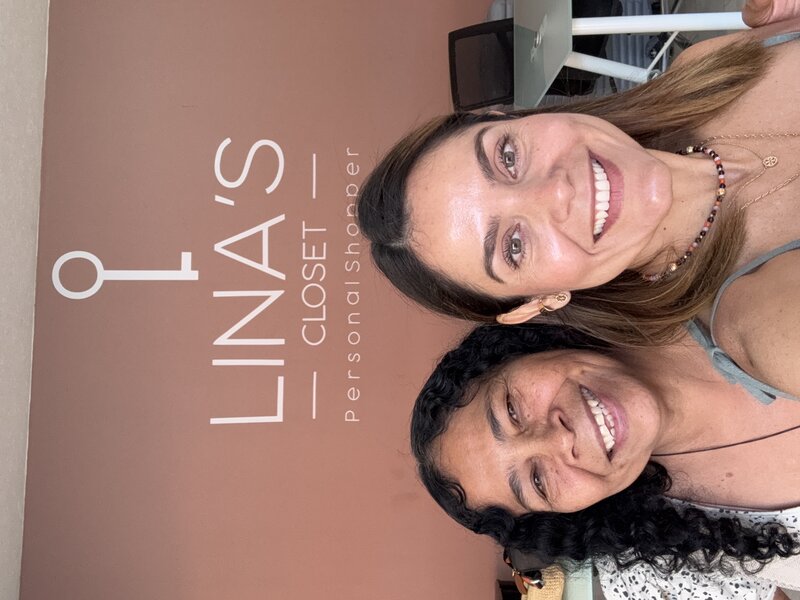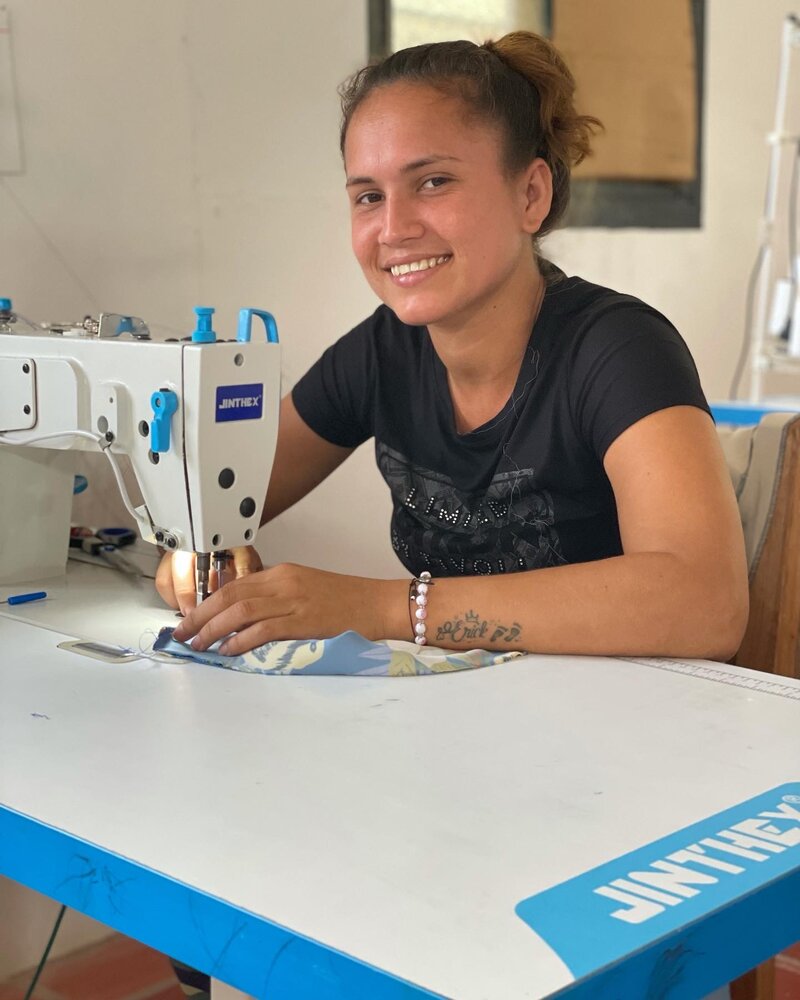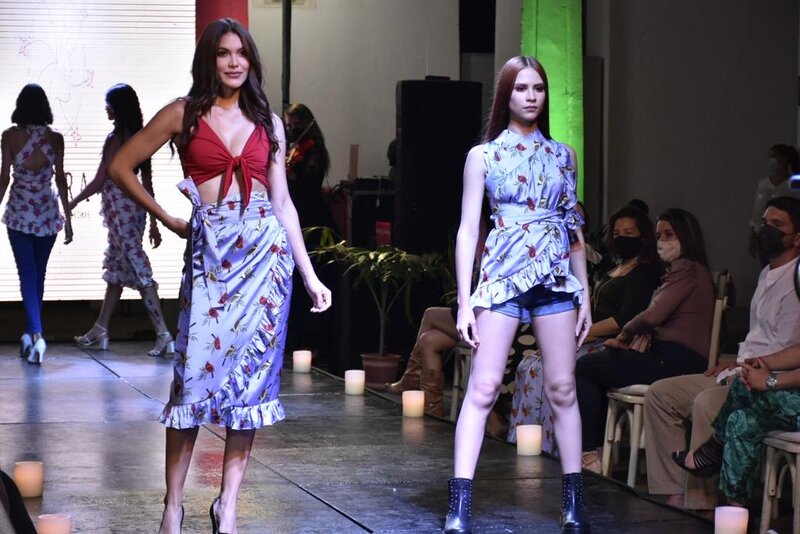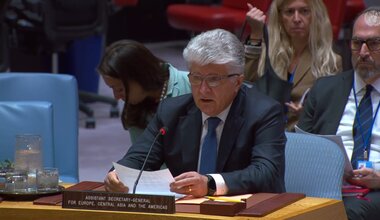Women peace signatories and entrepreneurs from Cúcuta continue building peace in Catatumbo
Despite the crisis in Catatumbo and the imminent relocation of the Caño Indio TATR in Tibú, Norte de Santander, ‘Ixora: Inclusivas y Autonómas,’ a brand born from a reconciliatory encounter between a peace signatory and a Cúcuta-based businesswoman in the fashion industry, stands firm in the face of adversity.

Katerin Avella is a peace signatory and social leader from Catatumbo. Since the signing of the Peace Agreement in 2016, she has lived in the Caño Indio territorial area for training and reintegration (TATR), in rural Tibú, Norte de Santander. Lina Garcés is an economist from Universidad Externado de Colombia. She is a fashion expert and the founder of ‘Lina’s Closet,’ a second-hand clothing boutique in Cúcuta, which she describes as “apparel with second chances.”
Their lives, seemingly worlds apart, crossed paths and sparked the creation of ‘Ixora: Inclusivas y Autónomas,’ a brand that manufactures printed skirts inspired by the ever-blooming Ixora flower that grows of Catatumbo: a symbol of resilience and perseverance. Together, they developed this brand, and are determined to keep it thriving despite the recent crisis in Catatumbo and the imminent relocation of the Caño Indio TATR due to security concerns.
Driving peace forward
It all started in 2020 in Caño Indio, when five women peace signatories joined forces with three women from the local community and founded the association ‘Puntadas por la Paz.’ With support from international cooperation and national agencies, they opened a sewing workshop aimed at creating income-generating opportunities and a safe, empowering space for women—contributing to the prevention of gender-based violence.
Lina and Katerin met in 2021 through an initiative of the United Nations Verification Mission in Colombia, which organized an haute couture workshop in Caño Indio to strengthen the Puntadas por la Paz project. The goal was to deliver a high-fashion training program, with expert designers traveling to the TATR to help the women refine their creations. Lina was one of the invited experts.
Lina’s personal experience with the conflict had left her wary toward the peace signatories. “I carried a deep sorrow. I grew up angry because the guerrilla kidnapped my uncles; I even answered the phone calls of those men when I was a little girl,” she recalled. Still, moved by a deeply personal decision to forgive, she embraced this challenge without ever revealing her story.
She invited fashion designer Mónica Bachué, founder of the brand ‘Leporinos,’ and together they led an intensive fifteen-day workshop. When they first arrived in Caño Indio, they were struck by how deep in the jungle the settlement was. White prefabricated drywall housing units with zinc roofs stood amid improvised dirt roads, with a cluster of communal bathrooms nearby. It was a stark contrast to the comfort and convenience of urban life.

During the first session, which focused on sizing, cutting, and design, Lina was struck by the participants’ natural talent. “The woman stitching that day had once sewn boots for war; the one making the cuts did so with the steady hand of a seasoned expert,” she recalled. Together with the guest designer, Lina encouraged a shift their perception of fashion—steering them away from the sweatpants and boots that still bore the remnants of war. In their place, they envisioned something more feminine: garments with thoughtful design and printed patterns. This marked the beginning of the Ixora skirts.
Bonds of reconciliation
At the end of the first day, Lina and Mónica stayed for dinner and spent the night at Katerin’s home, inside the TATR. “I cooked for them, and they enjoyed the meal,” Katerin recalled. “When it was time to clean up, I reached for the plates to clear them, and Lina stood up to wash them. I thought: ‘There’s no way this woman does the dishes in her own home…’” Later that night, the lights went out. Power in the TATR is unreliable and often intermittent. Concerned about the heat and the insects, Katerin suggested they step outside to look at the starry sky—a peaceful moment for connection and conversation. “I could feel it—Lina was genuine. Her empathy wasn’t just a formality. Many people don’t even want to hear about Catatumbo, so it meant a lot that a woman like her came all the way here to learn how we live,” she said.
The skirts of peace
Beyond the friendship forged between Lina and Katerin, this journey led to the refinement of skirts adorned with Ixora-inspired prints as an expression of beauty and strength blossoming in the face of adversity. On 30 December 2021, they presented the collection during a moving runway show at the Julio Pérez Library in Cúcuta, bringing together victims of the armed conflict and peace signatories. The event became a stage where fashion transcended aesthetics and became a vehicle for peace and reconciliation. Following the show, Lina launched the skirts on her website. Gradually, other designers joined the initiative, helping bring the garments to regional shops and boutiques.

Forgiveness
In September 2023, during the Cúcuta Book Fair, Lina and Katerin shared their experience in a panel discussion sponsored by the United Nations. It was the first time Lina shared her personal story with Katerin. “It was overwhelming—I cried, I shouted; in the end, we all cried, and the audience was really moved,” Lina recalled. Speaking to the audience, she said: “Today, I see them as women of great sensitivity, striving to build a new future with their families. They are devoted to their families and to bettering themselves, and they deserve forgiveness. I chose to forgive—and now I want to stand by them, and make sure others see their commitment to peace.”
Thanks to Lina’s work, the drive of other designers, and the support of the United Nations Verification Mission in Colombia, the International Organization for Migration (IOM), Pastoral Social, and national institutions such as the Agency for Reintegration and Normalization (ARN), among others, the project evolved into a successful initiative that flourished beyond the borders of Catatumbo.
Ixora was also included in the National Network of Clothing for Peace (RENA C), which brings together 30 initiatives led by peace signatories across Colombia. This opened the door for the women of Ixora to shine on the catwalk—both in Norte de Santander and beyond. Their skirts were featured in runways in Tibú, Cúcuta, Ocaña, and Bogotá. In 2022, they made their debut at Colombiamoda in Medellín, Colombia’s premier textile fair and one of Latin America’s most celebrated fashion events. In 2023, they returned as special guests on the runway.

The crisis
In January of this year, violence in Catatumbo escalated to critical levels. Among the victims were four children, four social leaders, and six former combatants. “According to the Office of the Ombudsperson, some 65,000 individuals were displaced between January and April 2025, and many are yet to return to their homes.” This figure appears in the most recent report of the United Nations Verification Mission in Colombia, published earlier this month: “The Ombudsperson, the Mission, and others in the international community called for respect for international humanitarian Law,” the report states.
The crisis unfolded in the very territory where the project participants lived, affecting their neighbors and family members. As a result, the workshop was forced to shut down. “The women didn’t want to go back—they were afraid,” Katerin recalled. “Even now, many families of former combatants remain displaced.”
However, amid the crisis, Katerin received a message from the Superintendence of Industry and Commerce: Ixora, Inclusivas y Autónomas had officially been registered as a trademark. The conclusion of this process, more than a year in the making, meant that the brand’s name and logotype was legally protected across Colombia, and could not be used by anyone else. “We chose to remain silent,” Katerin explained, “out of respect for the situation and the uncertainty surrounding our future.”
According to the ARN, the humanitarian emergency in Catatumbo has had profound consequences for the economic, social, community, and political dimensions of the reintegration process. The Agency reports that there are currently 516 peace signatories in the region: 198 living in urban centers and 318 in dispersed rural areas. Armed groups have taken of 31 productive projects led by peace signatories, while another 63 have been abandoned due to forced displacement. An additional 110 initiatives are struggling to access supplies and bring their products to market.
As violence around Caño Indio spiraled out of control, productive projects were thrown into uncertainty. Many peace signatories chose to leave the area, and the Government intervened to assist with their relocation for safety reasons.
On 12 May 2025, the National Land Agency allocated 1,055 hectares of land to relocate the Caño Indio TATR to a rural area of Cúcuta. There, the ARN plans to build houses with basic utilities, and the productive projects will be moved closer to the city. While the relocation process is underway, Puntadas por la Paz has cautiously resumed operations and is working on a new partnership to launch a shoe production line. The association hopes that the new TATR site will include a dedicated space for the workshop, marking the beginning of a new phase for this initiative.
As of May 2025, a total of 6,076 individual and productive projects had been approved, involving 99 per cent of former combatants active in the reintegration process, including 2,873 (25 per cent) women. Puntadas por la Paz is one of such projects.
However, according to the latest report of the United Nations Verification Mission, challenges for the economic sustainability of the collective productive projects persist. “To date, only 2 of the 20 women-led productive projects targeted by the strategy have received support. The significant contribution of women’s cooperatives to local development and reconciliation—as seen in Caquetá, Cauca, and Norte de Santander Departments—calls for more support to these initiatives.”
For Katerin, “Ixora is a dream; beyond the economic aspect, it means keeping Puntadas por la Paz and the brand alive.” Lina, for her part, believes that the skirts that helped her forgive and heal will continue to open paths to reconciliation and contribute to building a lasting peace in Colombia. She also hopes to sell the skirts that remained in stock before the crisis, and that the project—and the brand—will bloom again despite all the odds, just like the flower they are named after: a living symbol of the resilience of those who signed the Peace Agreement and remain steadfast in their commitment to peace.

By: Diego Morales and Jorge Quintero
Public Information Officers
UN Verification Mission in Colombia
 UN
UN





